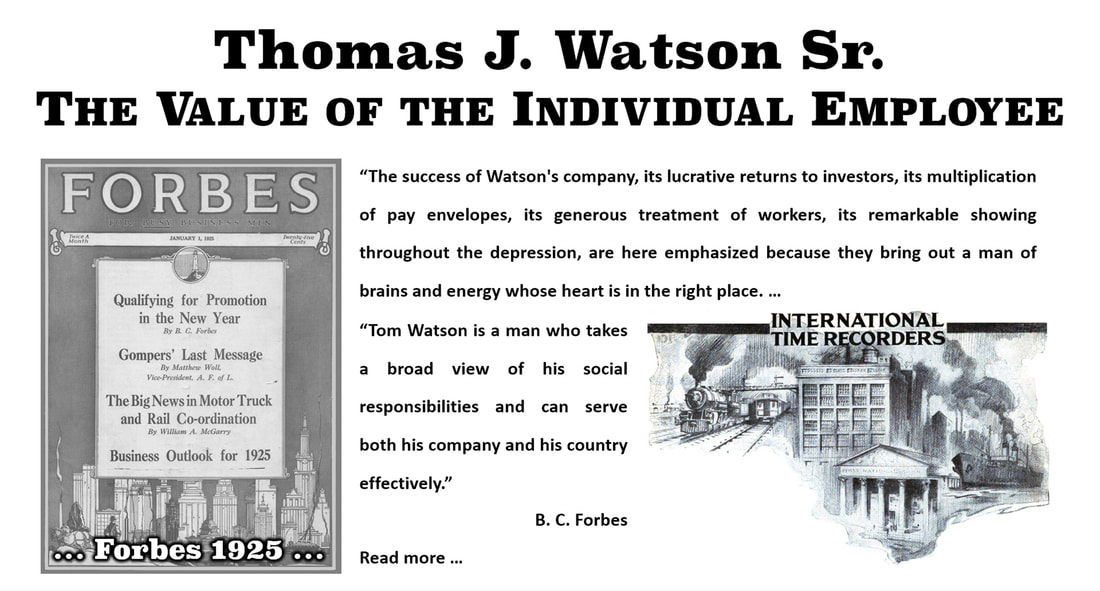The Value of the Individual Employee
Firm's Business Is Gaining Steadily
Watson Stresses Value of Individual Workers
by B. C. Forbes, Syracuse Journal, September 15, 1936
Watson Stresses Value of Individual Workers
by B. C. Forbes, Syracuse Journal, September 15, 1936
The Value of the Individual in Thomas J. Watson Sr.'s IBM
|
One of the most successful enterprises in America has been the handiwork of a business man who has discharged and is discharging bewildering variety of pro bono public duties equally successfully, Thomas J. Watson, president of International Business Machines Corporation.
It has been one of the few companies which have come through the depression without cutting the income of its stockholders. It has not been uncommon for IBM to be the highest priced stock actively dealt in on the New York Stock Exchange. Its financial position today is stronger than in the boom years. The company's net profits for the first six months of this year after federal taxes approximate $3,832,000. |
B. C. Forbes, 1922
|
This year [1936] it has paid dividends at the rate of $6, plus a 3 per cent stock dividend.
B. C. Forbes Notes the Business' Growth During the Great Depression
Any investor who put $6,114 into this business when Tom Watson took hold of it just over 20 years ago would have received dividends averaging almost $2,000 every year, and would have enjoyed an increase in capital to approximately $118,500. The number of employees has multiplied from 235 to over 3000.
Ceaseless vigilance has contributed to this phenomenal success.
"Last year," Mr. Watson tells me. "We were issued 81 patents carrying 808 claims, and our total patents now aggregate 874 with 10,134 claims. Our research expenditures are today larger than ever before in our history."
Employees have generously shared in the company's success. This statement from Mr. Watson should encourage other large employers to reduce hours and increase wages: "In the last two and one-half years the company has reduced working hours of its factory employees from 48 to 40. Since then we have increased the average pay for factory employees $3.49 a week.
Ceaseless vigilance has contributed to this phenomenal success.
"Last year," Mr. Watson tells me. "We were issued 81 patents carrying 808 claims, and our total patents now aggregate 874 with 10,134 claims. Our research expenditures are today larger than ever before in our history."
Employees have generously shared in the company's success. This statement from Mr. Watson should encourage other large employers to reduce hours and increase wages: "In the last two and one-half years the company has reduced working hours of its factory employees from 48 to 40. Since then we have increased the average pay for factory employees $3.49 a week.
|
Recently Mr. Watson wrote on a bulletin the words, "Manufacturer, manager, man.'' He drew a pen through all but the first three letters of the first two and wrote this comment:
"This one point we should keep in mind at all times, regardless of what our occupations are; we are just men—men standing together shoulder to shoulder; the good of each of us as individuals affects the greater good of the company. |
Tom Watson's "The Man Proposition"
|
B. C. Forbes Stresses the Success of the Corporation
The success of Watson's company, its lucrative returns to investors, its multiplication of pay envelopes, its generous treatment of workers, its remarkable showing throughout the depression, are here emphasized because they bring out a man of brains and energy whose heart is in the right place. A man who takes a broad view of his social responsibilities and can serve both his company and his country effectively.
Few industrialists cooperated more loyally with the present administration in the organizing of NRA codes, in counseling with President Roosevelt and department heads, with a view to preventing the adoption of policies injurious to business and, therefore, to employment.
Few industrialists cooperated more loyally with the present administration in the organizing of NRA codes, in counseling with President Roosevelt and department heads, with a view to preventing the adoption of policies injurious to business and, therefore, to employment.


